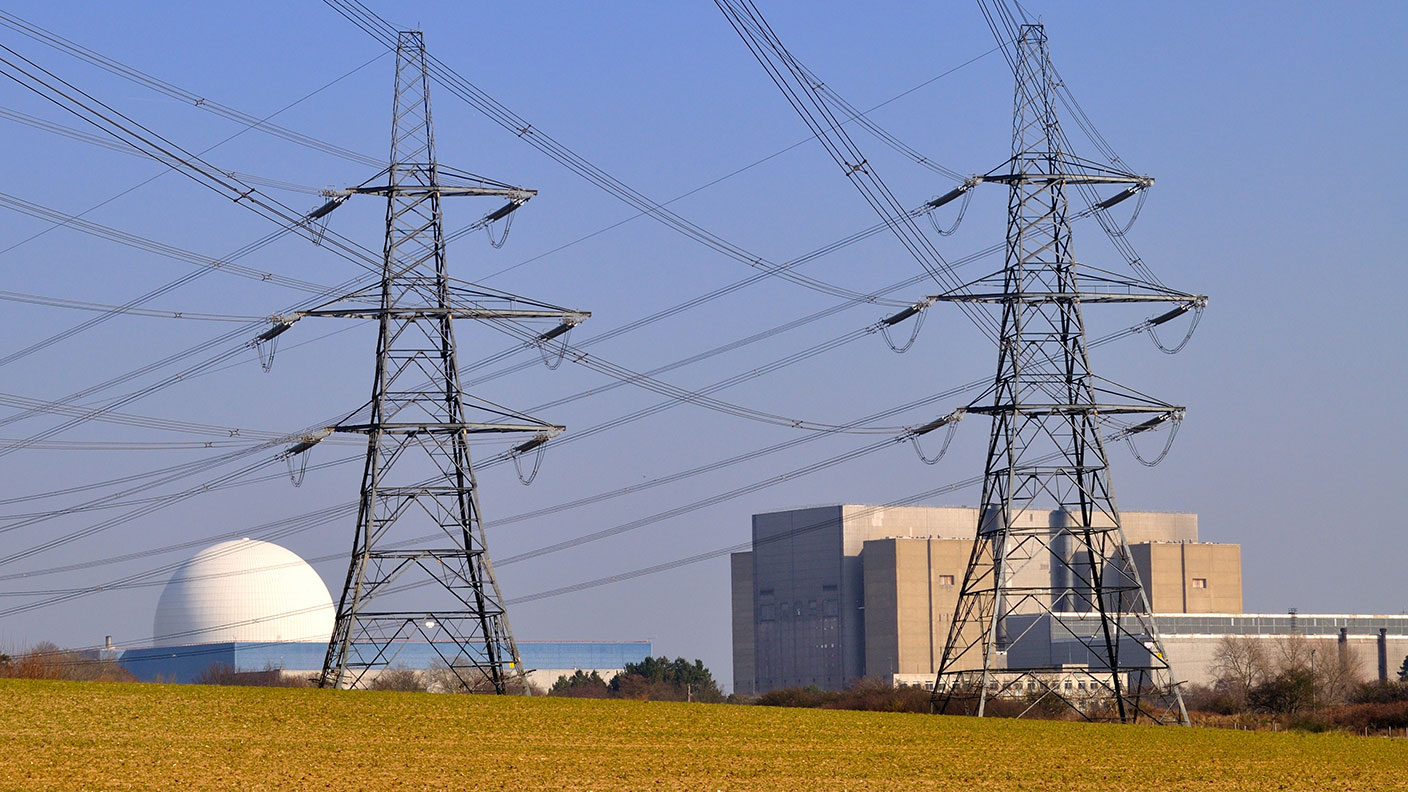Nuclear power might never be popular – but now looks a good time to invest
Nuclear power gets a very bad press, but it is the ultimate renewable energy source. Interest in it is perking up again, says John Stepek. Which means uranium is at the beginning of a big bull market.


Get the latest financial news, insights and expert analysis from our award-winning MoneyWeek team, to help you understand what really matters when it comes to your finances.
You are now subscribed
Your newsletter sign-up was successful
Want to add more newsletters?

Twice daily
MoneyWeek
Get the latest financial news, insights and expert analysis from our award-winning MoneyWeek team, to help you understand what really matters when it comes to your finances.

Four times a week
Look After My Bills
Sign up to our free money-saving newsletter, filled with the latest news and expert advice to help you find the best tips and deals for managing your bills. Start saving today!
We all know that the big buzz term in investing today is “ESG”. Investing with environmental, social and governance principles in mind is all the rage, with fund managers falling over themselves to prove how sustainable and ethical and all the rest of it that they are.
And yet, arguably one of the most environmentally sustainable investments you could make right now, seems unlikely to make most people’s “ethical” lists.
We are talking, of course, about uranium.
MoneyWeek
Subscribe to MoneyWeek today and get your first six magazine issues absolutely FREE

Sign up to Money Morning
Don't miss the latest investment and personal finances news, market analysis, plus money-saving tips with our free twice-daily newsletter
Don't miss the latest investment and personal finances news, market analysis, plus money-saving tips with our free twice-daily newsletter
The ultimate renewable energy source
Nuclear power is the ultimate renewable energy source. It doesn’t release lots of carbon into the air and, unlike wind and solar, it doesn’t rely on a massive breakthrough in battery capacity or a revolution in electricity grid structure to become a true successor to fossil fuels. Nuclear is always on, day or night, windy or not.
So it seems like a sensible option for a world that keeps going on about how we need to hit “net zero” emissions. Like it or not, if we want to do that on a global basis, it means we can’t achieve it through “offsets”. Offsets sound nice and very convenient, but it simply means exporting all your fossil fuel emissions to another country, and last I looked, all of those countries are still on the same planet, even the really, really far away ones.
So nuclear looks like an easy choice to make. Unfortunately it’s not that simple. The Fukushima disaster in Japan – which happened just over ten years ago – set nuclear back drastically.
As it turns out, the Fukushima disaster is mis-named. The earthquake and tsunami killed over 18,000 people. The damage to the nuclear plant itself apparently killed one person.
And yet that catastrophe not only halted nuclear power generation in Japan (which was understandable), it also saw a sentiment-driven, gross overreaction in Germany, where nuclear power was entirely halted. So what’s changing now?
Well, what with everyone getting more serious about this carbon reduction stuff, and Fukushima now being quite a long way into the distance behind us, and China forging ahead regardless – not to mention that we’ve now had a long bear market in nuclear and commodities in general – interest is perking up again. For example, in the US, Joe Biden has indicated that nuclear will be part of its “clean energy standard”.
In turn, that all means people are getting excited about a sector that last peaked in 2008 and has never really recovered since. And with the uranium price still at around $35 a pound – versus more than $130 at its peak – you can see why investors might be keen. So should you be investing in uranium too?
Nuclear power really suffers from the “ick” factor
The truth is that I don’t know if we’ll ever get over our squeamishness about nuclear power.
There’s something almost supernatural about nuclear power and radiation. It’s an invisible force that you can’t hear or smell, and it’s busily rampaging around inside you wreaking irrevocable damage at a cellular level. Not only that, but it’s practically immortal. That’s creepy. There’s no other word for it.
To be clear, this is almost entirely irrational. The statistics amply demonstrate that. Even the worst nuclear disasters simply haven’t killed very many people. Nor have they caused the waves of cancer and birth defects and all the rest of it that we were led to expect back in the days of the Chernobyl disaster (not that the reporting around Fukushima was much better).
Meanwhile, we accept particulates and air pollution arising from the burning of coal and wood and all the rest of it because we feel as though we understand it. You burn things, they give off little particles. We get that. Yes they kill some people, but you’ve got to drive, you’ve got to have energy, you’ve got to live.
In fact, I’m sure there’s someone reading this right now, taking a long soothing draw on their seventh cigarette of the day, as they shake their head and think: “John just doesn’t get it. Nuclear power is dangerous.”
So, like it or not, the “ick” factor with nuclear is extremely strong.
If you then combine that with a much more rational scepticism about the ability of governments and organisations to manage this stuff responsibly at all times, over a time horizon that stretches out to infinity, then the PR hill to be climbed here is extraordinarily high.
The uranium bull market appears to be getting going again
However, from an investment point of view, all you really care about is getting on board the uranium bull market when it gets going, and trying to step off it with some profits intact once it’s over.
And right now, it looks as though another bull cycle is getting going. As the FT reports, one index tracking uranium mining shares has already rallied by 35% this year, to a six-year high.
That sounds a lot, but you have to remember that when these boom or bust sectors get going, they boom for ages, then they bust for so long that no one thinks they’ll ever boom again. This in turn is why the booms always end up being so big, because the people who got burned in the busts simply can’t bear ever to get involved again.
So if you’re an active investor, or someone who has a “fun” portfolio on the side of your sensible core portfolio, then now looks a good time to own some assets that will benefit from rising interest in uranium and nuclear.
The good news is that playing the rising uranium price is reasonably straightforward via a few different methods. There are investment vehicles that allow you to bet on the price of the metal directly, while the other option is to go for the miners.
Miners carry their own risks, obviously, but they do tend to move with the price simply because there are a lot fewer ways to invest in uranium than there are to invest in a bigger market like gold, for example.
My colleague David Stevenson looked at some of the best ways to play the sector in MoneyWeek magazine a few issues ago. If you’re not already a subscriber, get your first six issues free here if you sign up now.
Get the latest financial news, insights and expert analysis from our award-winning MoneyWeek team, to help you understand what really matters when it comes to your finances.

-
 Should you buy an active ETF?
Should you buy an active ETF?ETFs are often mischaracterised as passive products, but they can be a convenient way to add active management to your portfolio
-
 Power up your pension before 5 April – easy ways to save before the tax year end
Power up your pension before 5 April – easy ways to save before the tax year endWith the end of the tax year looming, pension savers currently have a window to review and maximise what’s going into their retirement funds – we look at how
-
 Investors should cheer the coming nuclear summer
Investors should cheer the coming nuclear summerThe US and UK have agreed a groundbreaking deal on nuclear power, and the sector is seeing a surge in interest from around the world. Here's how you can profit
-
 Halifax: House price slump continues as prices slide for the sixth consecutive month
Halifax: House price slump continues as prices slide for the sixth consecutive monthUK house prices fell again in September as buyers returned, but the slowdown was not as fast as anticipated, latest Halifax data shows. Where are house prices falling the most?
-
 Rents hit a record high - but is the opportunity for buy-to-let investors still strong?
Rents hit a record high - but is the opportunity for buy-to-let investors still strong?UK rent prices have hit a record high with the average hitting over £1,200 a month says Rightmove. Are there still opportunities in buy-to-let?
-
 Pension savers turn to gold investments
Pension savers turn to gold investmentsInvestors are racing to buy gold to protect their pensions from a stock market correction and high inflation, experts say
-
 Where to find the best returns from student accommodation
Where to find the best returns from student accommodationStudent accommodation can be a lucrative investment if you know where to look.
-
 The world’s best bargain stocks
The world’s best bargain stocksSearching for bargain stocks with Alec Cutler of the Orbis Global Balanced Fund, who tells Andrew Van Sickle which sectors are being overlooked.
-
 Revealed: the cheapest cities to own a home in Britain
Revealed: the cheapest cities to own a home in BritainNew research reveals the cheapest cities to own a home, taking account of mortgage payments, utility bills and council tax
-
 UK recession: How to protect your portfolio
UK recession: How to protect your portfolioAs the UK recession is confirmed, we look at ways to protect your wealth.